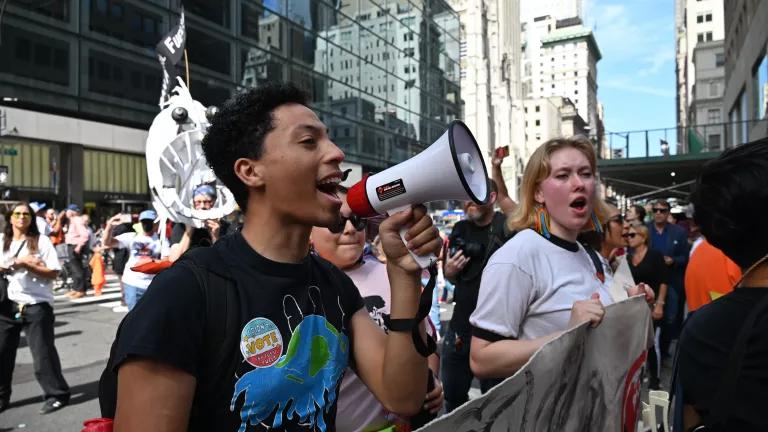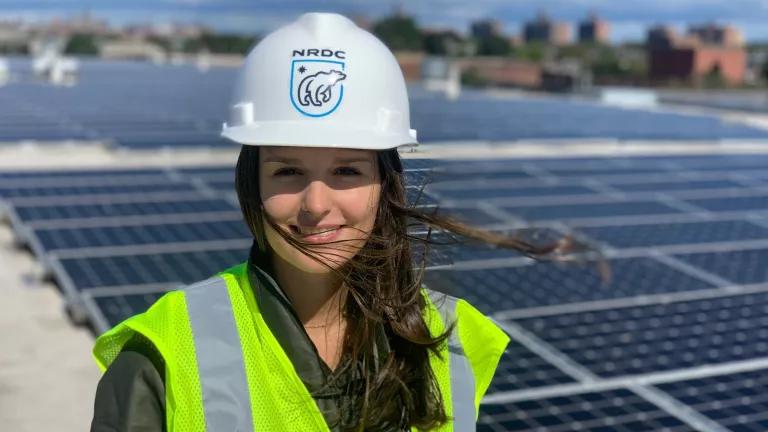Was This Year’s Climate Week Just More Talk?
Leaders in government and business must do more to phase out fossil fuels

Zero Hour at the March to End Fossil Fuels (Zanagee Artis left)
Stina Trollbäck, Zero Hour
Leaders in government, business, NGOs and institutions of higher education recently descended on New York City for another Climate Week. I was among the many people who traveled to the city to discuss solutions to the climate crisis and build community with fellow climate justice activists. Like previous years, there were some big announcements about sustainability and climate action, but I’m still pondering whether this year was more of the same or a real step toward meaningful action for a livable planet. After some reflection, here are my thoughts on Climate Week 2023.
To kick off the week, I took to the streets of Manhattan with my colleagues at Zero Hour for the March to End Fossil Fuels, where activists demanded that President Biden accelerate the phase out of oil and gas. Over 75,000 people marched with us, landing the protest on the cover of The New York Times. In the leadup to Climate Week 2023, the administration chose not to attend the UN Secretary General’s Climate Ambition Summit, which requested that countries offer updated and more ambitious climate goals. That decision had already tempered my expectations, and many of the movement leaders gathered in New York wondered if the administration would feel enough pressure to respond to our mobilization during Climate Week.
On the 30th anniversary of the establishment of AmeriCorps (which coincided with Climate Week), Senator Markey and Representative Ocasio-Cortez, alongside fellow members of Congress urged President Biden to create the Civilian Climate Corps through executive action. Senator Markey and Representative Ocasio-Cortez first introduced the Civilian Climate Corps for Jobs and Justice Act over two years ago and their proposal would have created 1.5 million jobs over five years. If enacted, their bill would “complete federally-funded projects that help communities respond to climate change and transition to a clean economy.” Two days later, the White House heeded their call and announced the American Climate Corps, a program that will provide 20,000 jobs over the first year to conserve lands and waters, deploy clean and efficient energy, and advance environmental justice. The program has already had overwhelming interest, with over 42,000 people signing up for the 20,000 slots available.
The delivery of the American Climate Corps was a major win amidst efforts from conservatives and Big Oil to stop policies like this from passing by legislative means. A climate corps advances important energy and just transition goals; however, we will continue to advocate for the administration to take bolder actions to stop the growth of fossil fuels. These include moves to phase out new drilling on federal lands and waters and blocking or revokingfederal permits for massive fossil fuel projects like the Calcasieu Pass 2 (CP2) LNG export terminal, the ConocoPhillips Willow Project, and the Dakota Access Pipeline. Amidst escalating climate disasters, government leaders, including the U.S. Congress, cannot lose sight of the core challenge of our time: rapidly phasing out fossil fuels.
I also spent time at Climate Week with business leaders. As a member of Ingka Group IKEA’s Young Leaders Forum, I attended IKEA’s Action Speaks Summit to discuss climate action in the private sector. IKEA’s efforts to convene climate activists and scientists with leaders in a variety of industries is notable, but its sustainability goals set the company in a league of its own. IKEA incorporated the voices and feedback of young leaders, including my own, in its Ingka Group Annual Summary and Sustainability Report and published a “Young Leaders' Opinion letter” as a part of the report. Per the report, “IKEA is on track to use 100% renewable electricity in its operations by 2025 and reduce absolute greenhouse gas emissions from its own operations (scope 1 and 2) by 80% by 2030 (based on a FY16 baseline).”
Meanwhile, my conversations with executives in fashion, technology, finance, consulting, packaging and shipping, and more highlighted that other businesses are still lagging far behind on sustainability, despite clear interest for bolder action from lower level executives. Still, there has been progress from the private sector on climate movement demands for a phase out of fossil fuels. Most recently, IKEA joined 131 companies representing nearly $1 trillion in global annual revenue to call on national governments to phase out fossil fuels and reach 100% decarbonized power systems by 2035.

Ingka Group Action Speaks Summit 2023
Ingka Group, IKEA
Despite the efforts by certain companies–like IKEA, Unilever, and Hewlett Packard Enterprise–to confront their fossil fuel consumption, this year’s Climate Week once again hammered home that businesses and government around the world must do more to advance climate justice by ending use of fossil fuels as soon as possible. Communities living in close proximity to fossil fuel infrastructure are not asking for fossil-fuel derived hydrogen hubs or new facilities to capture CO2 from fossil burning power plants. They’re asking for an end to the fossil fuels that are polluting their air and water. Governments must take the actions necessary to start heeding these calls.
So was New York Climate Week just more talk? Yes and no.
One of my favorite events of the week was a dialogue convened by Purpose and facilitated by the United Nations Under-Secretary General for Communications. The dialogue’s focus was “Turning the Tide on the Climate Information War,” and it convened some of the most well-known leaders in philanthropy, business, communication, climate advocacy, and education. We discussed how to combat misinformation, clearly communicate climate science, and convey the gravity of the climate crisis, while simultaneously preventing disillusionment and despair.
Climate Week offered an opportunity for Gen-Z climate activists to be in the room with business executives and senior government officials who have long neglected to adequately address climate justice. I engaged in protest and discourse that could lead to climate justice action across business sectors and government, but whether these engagements will translate into bolder actions remains to be seen.
The world’s ability to delay action on climate change is over. People everywhere on the planet are experiencing the impacts of global reliance on fossil fuels, with wildfires, flooding, sea level rise and premature deaths caused by pollution on every continent.
Not even a week after the end of climate week, New York City experienced flooded streets and subway stations with waist-high water, a symptom of the climate crisis. The city recorded the second highest amount of rainfall in over 150 years, and it was yet another harrowing reminder that dialogue means nothing without action.
It is time to end the era of fossil fuels. Continued reliance on dirty energy is putting our homes and livelihoods in jeopardy for fossil fuel profits.
The message that the climate movement will continue to deliver is clear: We will not stop protesting until world leaders and the private sector answer the call for climate justice. We will never stop fighting for the places we call home. We have a right to a livable future.




